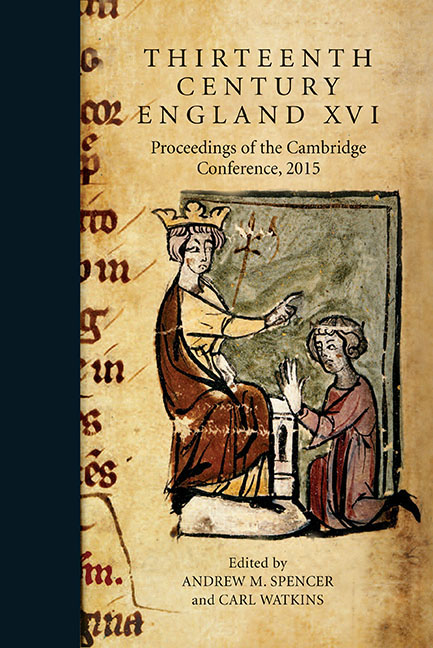Book contents
- Frontmatter
- CONTENTS
- List of Illustrations
- List of Contributors
- List of Abbreviations
- Introduction
- The Uncertainties of Reformers: Collective Anxieties and Strategic Discourses
- Moral Dilemmas in English Confessors’ Manuals
- Damnatio Eternae Mortis or Medicinalis Non Mortalis: The Ambiguities of Excommunication in Thirteenth-Century England
- The Contribution of Thomas Docking to the History of Political Thought
- Dealing with Inadequate Kingship: Uncertain Responses from Magna Carta to Deposition, 1199–1327
- The Rebel's Four Dilemmas in the Long Thirteenth Century
- The Daughters of William the Lion and Queen Ermengarde
- Simon de Montfort and the Ambiguity of Ethnicity in Thirteenth-Century Politics
- The Hue and Cry in Thirteenth-Century England
- Recalling Anglo-Scottish Relations in 1291: Historical Knowledge, Monastic Memory and the Edwardian Inquests
Simon de Montfort and the Ambiguity of Ethnicity in Thirteenth-Century Politics
Published online by Cambridge University Press: 23 August 2019
- Frontmatter
- CONTENTS
- List of Illustrations
- List of Contributors
- List of Abbreviations
- Introduction
- The Uncertainties of Reformers: Collective Anxieties and Strategic Discourses
- Moral Dilemmas in English Confessors’ Manuals
- Damnatio Eternae Mortis or Medicinalis Non Mortalis: The Ambiguities of Excommunication in Thirteenth-Century England
- The Contribution of Thomas Docking to the History of Political Thought
- Dealing with Inadequate Kingship: Uncertain Responses from Magna Carta to Deposition, 1199–1327
- The Rebel's Four Dilemmas in the Long Thirteenth Century
- The Daughters of William the Lion and Queen Ermengarde
- Simon de Montfort and the Ambiguity of Ethnicity in Thirteenth-Century Politics
- The Hue and Cry in Thirteenth-Century England
- Recalling Anglo-Scottish Relations in 1291: Historical Knowledge, Monastic Memory and the Edwardian Inquests
Summary
For he was not a traitor, but the most devout cultivator and most faithful protector of the Church of God in England, and the shield and defender of the kingdom of the English, enemy and expeller of the aliens, although he was one of them by nation.
This description of Simon de Montfort given by the Melrose chronicler highlighted the ambiguity that even contemporaries noted about his position. The earl of Leicester was a leading figure in baronial opposition to the king in which royal favour to foreigners came under significant criticism; yet he was also a man of French origins whose early career in England had been marked by royal favour. This essay seeks to address this uncertainty, and will endeavour to present a few thoughts on the earl of Leicester's identity within the political spectrum of ethnicity in the reign of Henry III. In order to outline the context for a discussion of the ethnic identity of Simon de Montfort, it is first necessary to provide a broader depiction of the political construction of ethnic identity at this time. Following this, the essay will survey how de Montfort's identity was perceived and presented, exploring the tensions between Anglicising narratives and the recognition of his continued engagement with his ‘alien’ origins. Exploring these often seemingly contrasting narratives, it is possible to suggest some ways in which these tensions could be negotiated to allow Simon to function as the Melrose chronicler described him – ‘the enemy and expeller of aliens’.
The political construction of ethnicity in thirteenth-century England
Any account of the political construction of ethnicity in the reign of Henry III, and the identity of Simon de Montfort in particular, must first engage with the ways in which the question of the aliens has already been considered and explored in scholarship. In many ways, the treatment of Simon de Montfort is largely in keeping with the wider trends in the literature on thirteenthcentury England. The invaluable work undertaken by David Carpenter and John Maddicott in particular has highlighted the uncertainty regarding Simon's ethnic identity, but has not tended to explore the category of ethnicity in itself.
- Type
- Chapter
- Information
- Thirteenth Century England XVIProceedings of the Cambridge Conference, 2015, pp. 137 - 152Publisher: Boydell & BrewerPrint publication year: 2017



